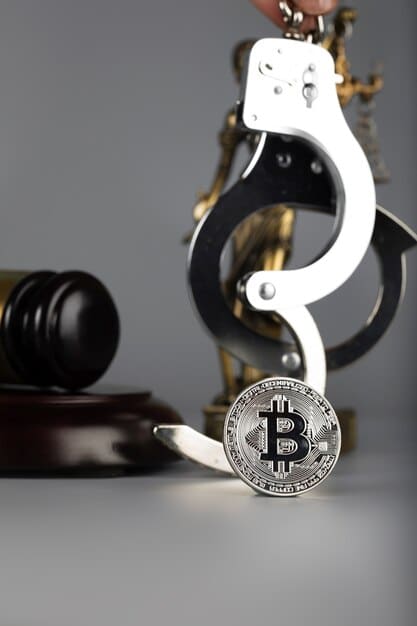US Cryptocurrency Regulation: Protecting Your Assets from Government Seizure

US cryptocurrency regulation necessitates understanding how to safeguard digital assets from potential government seizure through legal means, compliance strategies, and secure storage practices.
Navigating the evolving landscape of US cryptocurrency regulation: How to protect your assets from government seizure requires vigilance and strategic planning. Digital currencies, while offering unprecedented financial opportunities, also face increasing scrutiny from regulatory bodies and the potential for asset seizure under certain circumstances.
Understanding US Cryptocurrency Regulations

Understanding US cryptocurrency regulations is vital for anyone involved in digital assets. The regulatory landscape is complex and constantly evolving, with various federal and state agencies playing different roles. It’s important to know these regulations to avoid legal issues and protect your assets.
Cryptocurrencies are not uniformly defined or regulated across the US. Different agencies view them differently, leading to a fragmented regulatory environment.
Key Regulatory Bodies
Several key regulatory bodies have a significant impact on cryptocurrency in the US.
- Securities and Exchange Commission (SEC): The SEC often classifies certain cryptocurrencies as securities, bringing them under their regulatory purview.
- Commodity Futures Trading Commission (CFTC): The CFTC generally views cryptocurrencies as commodities and regulates cryptocurrency derivatives.
- Internal Revenue Service (IRS): The IRS treats cryptocurrencies as property for tax purposes, requiring investors to report gains and losses.
- Financial Crimes Enforcement Network (FinCEN): FinCEN focuses on preventing money laundering and illicit activities involving cryptocurrencies.
Staying informed about the roles and perspectives of these agencies is crucial for compliance.
These regulatory bodies may enforce different rules and standards, increasing the complexity for individuals and businesses dealing with cryptocurrencies. Non-compliance can result in severe penalties, including asset seizure.
Legal Framework for Asset Seizure
The legal framework for asset seizure in the US provides the government with broad powers to seize assets suspected of being involved in illegal activities. Understanding this framework is crucial for anyone holding cryptocurrencies.
Asset forfeiture laws allow the government to seize assets believed to be connected to criminal activities, even if the owner is not convicted of a crime.
Civil and Criminal Forfeiture
There are two primary types of asset forfeiture: civil and criminal.
- Civil Forfeiture: Allows the government to seize assets without a criminal conviction, based on the premise that the assets were involved in illegal activities.
- Criminal Forfeiture: Requires a criminal conviction and is part of the sentencing process. Assets directly linked to the crime can be seized.
Both types of forfeiture can impact cryptocurrency holdings if they are suspected of being tied to illegal activities.
The government must demonstrate probable cause to seize assets, but the burden of proof can vary depending on the specific circumstances. This makes it essential for cryptocurrency holders to maintain meticulous records and ensure compliance with all applicable laws.
Common Scenarios Leading to Cryptocurrency Seizure
Cryptocurrency seizures often occur in specific scenarios where digital assets are suspected of being linked to illegal activities. Knowing these scenarios can help you avoid potential pitfalls.
Several common scenarios can trigger cryptocurrency seizure, including money laundering, tax evasion, and involvement in illegal marketplaces.
Money Laundering and Illegal Activities
Cryptocurrencies can be seized if they are suspected of being used for money laundering or other illegal activities.
- Lack of KYC/AML Compliance: Using exchanges or services that do not comply with Know Your Customer (KYC) and Anti-Money Laundering (AML) regulations can raise red flags.
- Transactions with Blacklisted Addresses: Sending or receiving funds from addresses associated with illegal activities can lead to seizure.
- Structuring Transactions: Breaking up large transactions into smaller amounts to avoid detection can be seen as an attempt to evade regulations.
If your cryptocurrency transactions appear suspicious, they can be flagged and subject to seizure. Due diligence and transparency are crucial.
Engaging in practices that attempt to obscure the origin or destination of funds can lead to serious legal consequences, including asset forfeiture and criminal charges. Compliance with KYC/AML regulations is paramount to avoid these risks.

Strategies for Protecting Your Cryptocurrency Assets
Protecting your cryptocurrency assets from government seizure requires a combination of legal compliance, secure storage practices, and proactive risk management. Taking these steps can significantly reduce the risk of asset forfeiture.
Several strategies can help safeguard your cryptocurrency holdings from potential seizure. These include implementing robust security measures, maintaining detailed records, and seeking legal counsel when necessary.
Secure Storage Practices
Secure storage practices are crucial for protecting your cryptocurrency from theft and seizure.
- Cold Storage: Storing your cryptocurrencies offline in hardware wallets or paper wallets can significantly reduce the risk of online theft and seizure.
- Multi-Signature Wallets: Using multi-signature wallets requires multiple approvals for transactions, adding an extra layer of security.
- Strong Passwords and Encryption: Employing strong, unique passwords and encrypting your digital assets can prevent unauthorized access.
Implementing these storage practices can enhance the security of your cryptocurrency and protect it from unlawful seizure. Secure storage ensures that your assets are less vulnerable to both cyber threats and legal scrutiny.
Regularly reviewing and updating your security protocols is essential to stay ahead of potential threats and maintain the integrity of your cryptocurrency holdings. Staying informed about the latest security practices can provide an additional layer of protection.
Importance of KYC/AML Compliance
KYC/AML compliance is paramount for avoiding issues with regulatory bodies and reducing the risk of asset seizure. Adhering to these regulations can help you maintain a clean and transparent financial record.
Compliance with KYC/AML regulations demonstrates your commitment to transparency and legal operations, reducing the likelihood of scrutiny and potential asset seizure.
Choosing Compliant Exchanges
Selecting cryptocurrency exchanges that adhere to KYC/AML regulations is essential.
- Verification Processes: Compliant exchanges require users to verify their identity through documentation, ensuring accountability.
- Transaction Monitoring: Exchanges monitor transactions for suspicious activities and report them to regulatory authorities.
- Reporting Requirements: Compliant exchanges adhere to reporting requirements, providing transparency to regulatory bodies.
Using compliant exchanges can help you maintain a clear and verifiable transaction history, reducing the risk of government scrutiny. This practice demonstrates your commitment to operating within the legal framework.
Furthermore, ensure you understand the specific KYC/AML requirements of each exchange you use and comply fully with their verification processes.
Seeking Legal and Financial Advice
Navigating the complexities of cryptocurrency regulation requires expert guidance. Seeking legal and financial advice can help you stay compliant and protect your assets from government seizure.
Consulting with legal and financial professionals can provide clarity and ensure you are making informed decisions that align with your financial goals and legal obligations.
When to Consult an Attorney
Knowing when to consult an attorney is crucial to protect your assets effectively.
- Regulatory Changes: Consult an attorney when there are significant changes in cryptocurrency regulations.
- Large Transactions: Seek legal advice for large cryptocurrency transactions that may attract scrutiny.
- Asset Forfeiture Notices: Contact an attorney immediately if you receive a notice of asset forfeiture.
An attorney can provide guidance on how to respond to legal notices and ensure your rights are protected throughout the process. Timely legal advice can be the key to preventing asset seizure.
Financial advisors can help you manage your cryptocurrency investments in a way that minimizes tax liabilities and complies with reporting requirements. This proactive approach can reduce the risk of legal issues and potential asset seizure.
| Key Point | Brief Description |
|---|---|
| 🔑 Regulatory Compliance | Adhere to KYC/AML laws to avoid legal issues. |
| 🛡️ Secure Storage | Use cold storage and multi-signature wallets. |
| 📜 Record Keeping | Maintain detailed and accurate transaction records. |
| 👨⚖️ Legal Advice | Consult legal and financial experts for guidance. |
Frequently Asked Questions
▼
Cryptocurrency regulation in the US involves various federal and state agencies overseeing the use of digital assets. These agencies focus on different aspects such as securities, commodities, taxation, and anti-money laundering.
▼
Cryptocurrency can be seized if it is linked to illegal activities, such as money laundering, tax evasion, or transactions with blacklisted addresses. Civil forfeiture and criminal forfeiture are the two main methods.
▼
KYC/AML compliance is crucial for demonstrating transparency and legal operations. It helps avoid scrutiny from regulatory bodies and reduces the risk of asset seizure by ensuring you understand and verify your clients.
▼
Secure storage practices include using cold storage (hardware or paper wallets), multi-signature wallets, and strong, unique passwords. These methods protect your cryptocurrency from both online theft and potential seizure.
▼
You should seek legal advice when there are significant changes in cryptocurrency regulations, for large transactions that may attract scrutiny, or if you receive a notice of asset forfeiture to protect your rights.
Conclusion
Protecting your cryptocurrency assets from government seizure requires a proactive and informed approach. By understanding the regulatory landscape, implementing secure storage practices, adhering to KYC/AML compliance, and seeking legal and financial advice when needed, you can significantly reduce the risk of asset forfeiture and navigate the complexities of US cryptocurrency regulations effectively.





